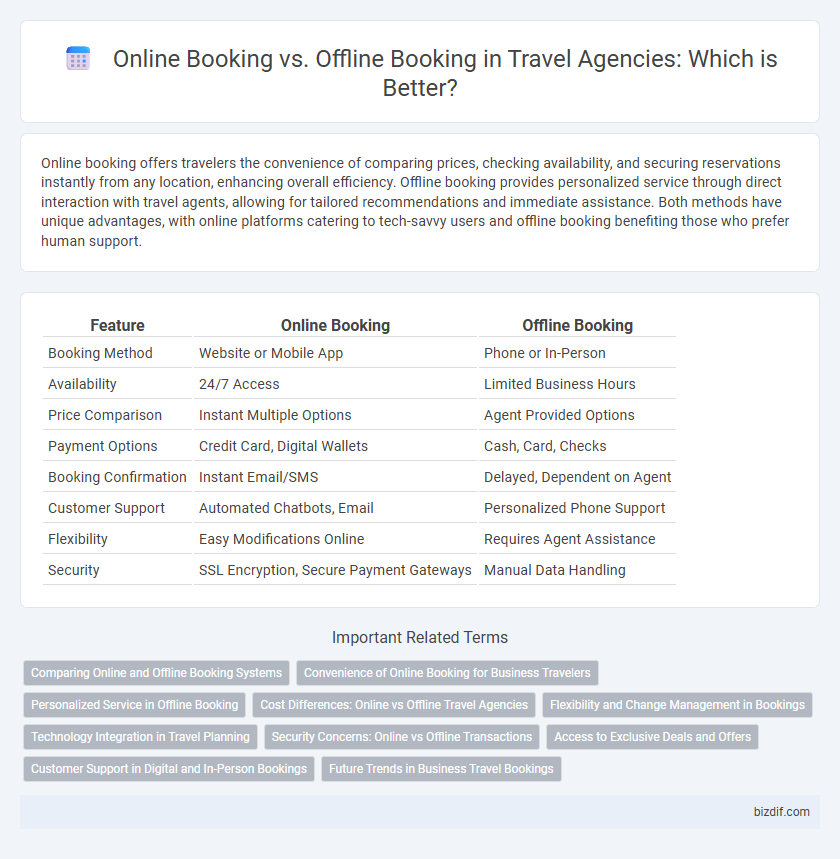Online booking offers travelers the convenience of comparing prices, checking availability, and securing reservations instantly from any location, enhancing overall efficiency. Offline booking provides personalized service through direct interaction with travel agents, allowing for tailored recommendations and immediate assistance. Both methods have unique advantages, with online platforms catering to tech-savvy users and offline booking benefiting those who prefer human support.
Table of Comparison
| Feature | Online Booking | Offline Booking |
|---|---|---|
| Booking Method | Website or Mobile App | Phone or In-Person |
| Availability | 24/7 Access | Limited Business Hours |
| Price Comparison | Instant Multiple Options | Agent Provided Options |
| Payment Options | Credit Card, Digital Wallets | Cash, Card, Checks |
| Booking Confirmation | Instant Email/SMS | Delayed, Dependent on Agent |
| Customer Support | Automated Chatbots, Email | Personalized Phone Support |
| Flexibility | Easy Modifications Online | Requires Agent Assistance |
| Security | SSL Encryption, Secure Payment Gateways | Manual Data Handling |
Comparing Online and Offline Booking Systems
Online booking systems offer instant access to a wide range of travel options, real-time availability updates, and user reviews, enhancing convenience and informed decision-making. Offline booking relies on direct interaction with travel agents, providing personalized service and tailored recommendations but often lacks immediate transparency and speed. Comparing these systems highlights that online platforms prioritize efficiency and broad choice, while offline methods emphasize customized support and human expertise.
Convenience of Online Booking for Business Travelers
Online booking offers unparalleled convenience for business travelers by allowing instant access to flight, hotel, and car rental options from any device, eliminating the need for physical visits to travel agencies. Real-time updates and easy itinerary management streamline last-minute changes, reducing stress and saving critical time during tight business schedules. Access to exclusive online deals and loyalty program integration further enhances the efficiency and cost-effectiveness of business travel planning.
Personalized Service in Offline Booking
Offline booking offers highly personalized service through face-to-face interactions, allowing travel agents to tailor recommendations based on individual preferences and real-time feedback. This hands-on approach enables agents to address unique travel needs, suggest customized itineraries, and provide immediate assistance with complex requests. The personalized attention enhances customer satisfaction and builds trust, factors often missing in automated online booking platforms.
Cost Differences: Online vs Offline Travel Agencies
Online travel agencies often offer lower prices due to reduced overhead costs and access to exclusive digital discounts, which translate into cheaper flight and hotel bookings for customers. Offline travel agencies may charge higher fees to cover physical store expenses and personalized services, making their packages comparatively more expensive. Budget-conscious travelers can save significantly by choosing online platforms, where dynamic pricing and real-time deals often provide better value than traditional brick-and-mortar agencies.
Flexibility and Change Management in Bookings
Online booking platforms offer superior flexibility by allowing travelers to modify or cancel reservations instantly through user-friendly interfaces without time constraints. Offline booking often requires direct communication with agents, which can delay change processes and limit options due to office hours and manual handling. The digital nature of online systems enables real-time updates, seamless itinerary adjustments, and enhanced customer control over travel plans.
Technology Integration in Travel Planning
Online booking leverages advanced technology platforms, enabling real-time access to flight, hotel, and tour availability, enhancing convenience and speed in travel planning. Offline booking often relies on face-to-face interactions, limiting immediate access to dynamic pricing and inventory updates. Integrating mobile apps, AI-based recommendations, and secure payment gateways in online systems revolutionizes the travel experience by providing personalized options and seamless transaction processes.
Security Concerns: Online vs Offline Transactions
Online booking platforms employ advanced encryption protocols and secure payment gateways to protect customer data and reduce the risk of fraud, making digital transactions generally safer than offline methods. Offline booking often involves physical cash or card payments without encryption, increasing vulnerabilities to theft or misuse of personal information. Implementing multi-factor authentication and secure servers enhances online transaction security, addressing many concerns related to digital travel bookings.
Access to Exclusive Deals and Offers
Online booking platforms provide travelers immediate access to exclusive deals and limited-time offers unavailable through offline channels, leveraging partnerships with airlines and hotels. Digital booking systems often feature real-time price comparisons and flash sales that maximize savings for users. Offline bookings may lack these dynamic discounts, limiting access to the latest promotional packages and specials curated specifically for online users.
Customer Support in Digital and In-Person Bookings
Online booking platforms offer 24/7 customer support through chatbots and live agents, enabling instant assistance for itinerary changes and travel queries. Offline bookings provide personalized, face-to-face customer service that can better address complex travel needs and build trust. Effective customer support in both methods enhances traveler satisfaction and can be tailored based on preferences for digital convenience or in-person interaction.
Future Trends in Business Travel Bookings
Future trends in business travel bookings show a strong shift towards online platforms due to increased demand for real-time itinerary management, personalized travel options, and seamless integration with corporate expense systems. Artificial intelligence and machine learning enhance online booking systems by providing predictive analytics and tailored recommendations, improving efficiency and traveler satisfaction. Despite this growth, offline booking remains relevant for complex travel arrangements requiring human expertise and negotiation.
Online booking vs Offline booking Infographic

 bizdif.com
bizdif.com